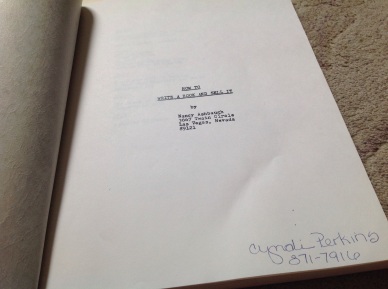
The quaintness of a typewritten, bound manuscript advising writers to tend to the keys and check ink ribbons for freshness.

Promotional advice from another era: “There is no need to publicize your paperback because most have a life of seven days only on the racks …after that the distributor sweeps them away and burns them to make room for the next books…Hard cover books survive with luck far longer… A writer ought to contact all the news outlets in his town and those surrounding. He should call on them, take a bottle of liquor perhaps, and take a vital interest in their work…”
Flashback to 1982, University of Nevada Las Vegas: I was young. The creative writing teacher’s pointed remark about women with “Alice In Wonderland complexes” went right over my head. My naiveté and eagerness, sitting there with a bow in my long hair, served me well. Undaunted by the offhand snarky snub, I soaked up every bit of writing advice without prejudice or preoccupation.
In addition to her novels, short stories, plays, radio programs and one film, “A Matter of Hands,” listed in the teaching text for the UNLV course “How to Write a Book and Sell It,” Nancy Ashbaugh in 1986 published “Juno: A Novel.” Nope, not the Juno made into an award-winning movie. https://www.youtube.com/watch?v=K0SKf0K3bxg
Ashbaugh’s best-known book is the 1971 (Vanguard Press) “Turn Left or Be Killed.” Here’s the Kirkus review: https://www.kirkusreviews.com/book-reviews/nancy-ashbaugh/turn-left-or-be-killed/
Her class was the first time I’d heard the bedrock writing adages “put your heroine up a tree and throw rocks at her” and “What’s at stake?” Here are a few more gems from “How to Write a Book and Sell It.”
Contrast
“If you will put an ordinary character into an extraordinary setting, or an extraordinary character into an ordinary setting then you will achieve drama and conflict.”
“Over each room door in a hotel I stayed in Germany there was a sculptured head of a lady in the fashion of a sailing ship’s figurehead of olden days. One morning when I came out I looked up and saw on the lovely carved cheek of the lady a cockroach resting itself. That is an example of contrast for drama.”
On Objectivity
“So often anything one thinks terribly clever is not. Do not drool sweetly or sadly over the typewriter.”
On Pacing
“If you follow your characters too closely you will slow the story to a stop.”
Her example is something I often see with new writers and editing clients: “She went to the door, passed the coffee table and turned the handle of the door and opened it and held it wide for him to enter.”
Instead of: “Hi Jim,” she said at the door.
Ashbaugh advocated short, strong “machine-gun style” writing to keep action moving.
She used a three-act playlet to show (not tell) how using “threats in threes” creates suspense, sets mood and evokes the pity and terror that creates compelling drama.
On Character
“The force of sex is the strongest motivation for a character, after war, in my opinion, although cold and hunger are also strong …”
I can’t find the hard copies of the short story I wrote for that class, “The Girls with Sad Soft Eyes,” set in an abortion clinic in a Detroit suburb in the early 1970s. I still remember the pleasure of her reading parts of it aloud to the class and pronouncing it publishable. It never did see print. I sent it off to one of those back-of-the-magazine advertisers (right next to the drawing of the deer ‘test’ for prospective artists to copy) who wanted me to pay to have it edited and promised it would reach the right people in that penultimate publishing mecca, New York City.
Did I mention how naïve I was?
I think my residual prejudice toward self-publishing springs from that early 1980s “Vanity Press” experience. Many forms of self-publishing now are entirely legit. The potential to write your story and put it out there faster than the typical 18-26 months it takes with a traditional publisher is super exciting. But I instinctively gravitate toward working with people who want to print my quality work because they believe in it, not because I’m giving them money.
My preliminary research shows that Nancy Ashbaugh passed away in 2007 at age 91. If the databases are incorrect then I am sure she would be delighted to make further snarky comments about rumors of her death being greatly exaggerated by that girl with the Alice-in-Wonderland complex. Thank you, dear teacher. Add me to the ranks of those you’ve helped take books to market.
There isn’t much I could find online about her legacy, but I think this Las Vegas Sun archived article speaks to her influence in a community and on a campus that has garnered praise for its MFA writing program.
http://lasvegasweekly.com/ae/print/2008/oct/30/life-letters-and-las-vegas/
Quick update on my debut novel “More Than You Think You Know”: Pre-print preparations continue. I’m celebrating every step of the process, including having my name on the “forthcoming” list. http://www.beatingwindward.com/books.html

Recent Comments